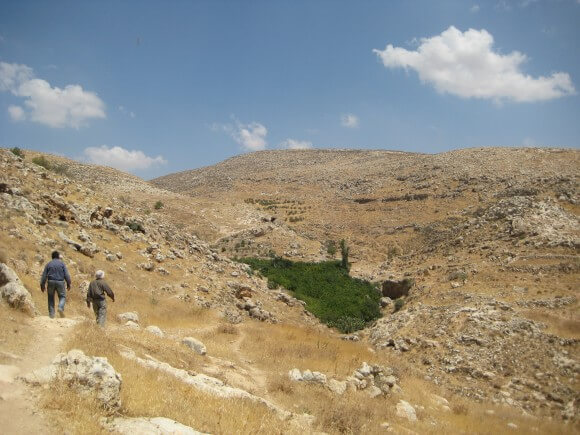
The heat and dust of the desert clime bears down on those wandering in the outskirts of Akraba, a Palestinian town in northern West Bank. Few signs of life can be spotted amidst the rocky terrain. Mohammad – a long-time inhabitant of the land and our local guide – points to a fleck of green in the arid desert landscape. We trod onwards through the valley, until the full wonder of lush pomegranate and lemon trees beckons us to Abo Dawa.
One would have easily missed this green oasis, if it were not for the conspicuous solar panels that are perched defiantly on the side of the valley. The anachronism could not have been starker: The 21st century photovoltaic cells that seek to harvest the sun’s electromagnetic radiation accompanied by the fruit trees’ reliance on the nearby water spring. Though the juxtaposition may at first seem contradictory, it is clear that they are the source of pride for the Palestinian farmers: the ability to live off the land and its natural resources.

Even at a time of worldwide economic downturn, foreign donors are developing ways to reinvigorate the West Bank economy, with rural agriculture and development as a focal component of their strategic objectives in the West Bank. As such, the Spanish Agency for Cooperation and Development has financed the installation of centralized solar micro-grid systems in isolated West Bank communities to improve their quality of life.
Abo Dawa is one such community that has benefited from the Spanish-funded solar panels. The community currently has 21 solar panels and a battery room installed, providing electricity for the water pumps that irrigate Mohammad’s fruit trees. The ability to irrigate his land is of vital importance, Mohammad explains, given that the fruit trees are his main source of income.
The micro-grid undoubtedly eases the lives of Abo Dawa’s Palestinians, but it also makes a political statement given the partitioned landscape of the West Bank. Abo Dawa is situated in Area C – an area under full Israeli military control – and is declared a closed military zone. As Mr. Carlos Sordo, manager of the micro-grid project, points out, “Abo Dawa was chosen as the site of the micro-grid project because it enjoys natural water resources and is placed in an isolated rural area in the West Bank.” The aid of the solar panels thus provide an added impetus for the Palestinians to remain on their land.
Despite the strong will of its Palestinian farmers, Abo Dawa is under constant threat from violence perpetrated by Israeli settlers. The community’s only crime is being in close proximity to the Itamar settlement; the consequent punishment is that Palestinian livestock are targeted and fruit trees are often destroyed, thereby crippling a crucial source of income. Their vulnerable situation is exacerbated by their physical isolation from surrounding Palestinian communities. With no roads for vehicle access – it takes a full half hour hike through mountainous terrain to reach the nearest road – coupled with no electricity, it is difficult for the farmers to seek medical assistance or protection when under attack from local Israeli settlers.
These isolated communities are at the highest risk of being forced from their homes and ancestral lands. Mohammad recounts how his grandfather built the first family house with his own hands. However, when the settler violence began, he was given little option but to leave his home. Today, Mohammad and his family live in Akraba and only travel into Abo Dawa to tend after their remaining fruit trees.
Mohammad’s fragile hold onto his land is further threatened by Israeli military interference. Despite the generous aid donation and the resounding success of the solar project at Abo Dawa, the Israeli military has recently issued a stop work order for the battery room. This equates to the threat of a demolition order for the solar panel system – a project that cost around 40,000 Euros to install – and would add to the hundreds of Palestinian structures that are demolished each year by Israel.
The complications of implementing development projects in Area C were apparent at Abo Dawa during the installation of the micro-grid system: The Israeli military brought the whole village out of the site for a week, and two Palestinians were arrested on the last day of the installation. These obstacles from the military are unsurprising, Mr. Sordo notes, given that Israel “seeks to displace Palestinians from rural areas in order to occupy them via settlements…[and] one way to do so is by isolating the Palestinians even more – depriving them of electricity and other basic services – so that the people finally have to leave their fields and the natural resources contained there.”
For the farmers of Abo Dawa, the imminent demolition of the micro-grid system is another devastating attempt to sever their centuries-old ties to their green oasis. When asked if he will give up, Mohammad ponders for a moment and looks out to his lemon trees. “I belong to this land and I have a right to it,” he says, “But no one cares about the injustices happening here in Abo Dawa. No one.”

